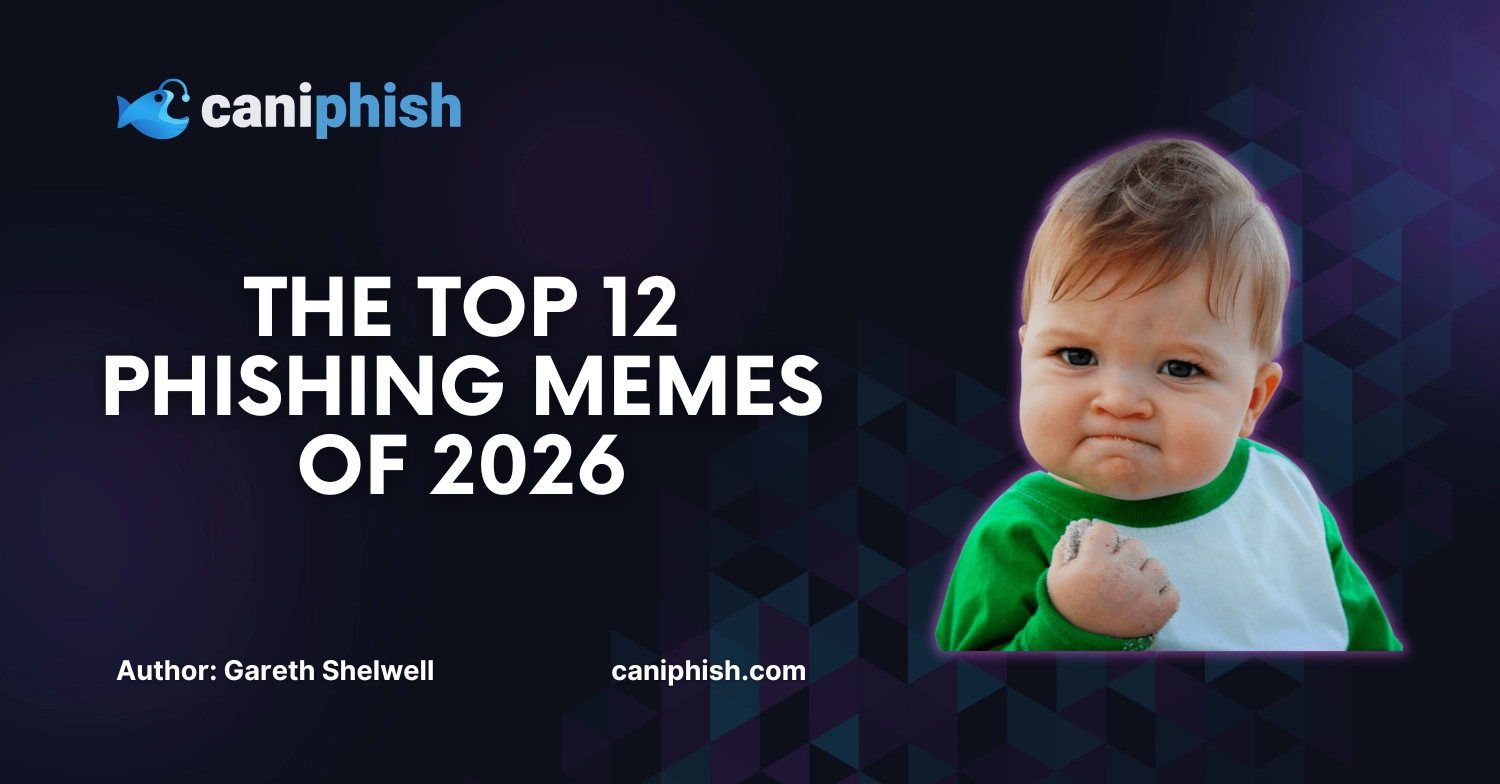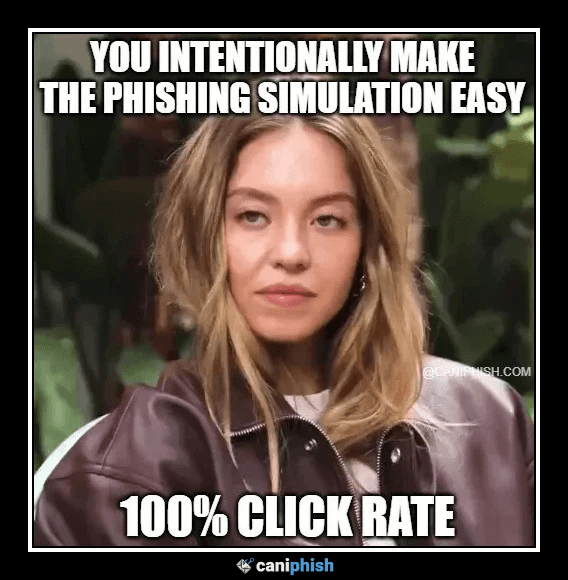The Top 12 Phishing Memes of 2026

- Why Use Memes in Security Awareness?
- #11 And What Do We Say To Simulated Phishing Emails Meme
- #11 And What Do We Say To Simulated Phishing Emails Meme
- #10 Surely Not, But Maybe Meme
- #9 It's Phishing Season Meme
- #8 Let The Fun And Games Begin Meme
- #7 Grandma Knows How To Stay Safe In the Cyber World Meme
- #6 Click Happy Crew Meme
- #5 Pack The Bags Honey! We're Going On Holiday Meme
- #4 You Get A Phish, And You Get A Phish, And You Get A Phish Meme
- #3 Dad Joke Meme
- #2 When Phishing Goes Too Far Meme
- #1 The Misunderstood Nigerian Prince Meme
In a world where inboxes are bombarded by a whopping 14.5 billion spam emails daily, it's high time we cracked a smile amidst the cyber chaos.
So, the meme connoisseurs at CaniPhish have taken a deep dive into the 'punny' world of IT security humor to serve you a plate of our most chuckle-worthy memes of 2026.
Jump To The #1 Phishing Meme Of 2026Why Use Memes in Security Awareness?
Memes are cultural touchstones. They are universally recognized, easily sharable, and can convey complex ideas in a simple, humorous format.
- Memes Engage & Educate.
Memes grab attention, making the viewer more receptive to the underlying message. - Memes Increase Knowledge Retention.
A good laugh is memorable. When paired with a security lesson, that memory can last longer. - Memes Promote Sharing.
People love sharing memes. More shares equate to more awareness.
With that said, let's dive in to the Top 12 Phishing Memes of 2026!
#12 Easy Phishing Simulation Fail Meme
Early phishing simulations are meant to be easy. Grammatical errors, check. Obviously dodgy links, check. Domains that scream fake, check. The idea is to teach, not humiliate.
If everyone clicks anyway, great! You’ve just discovered why training exists.
Start obvious. Let people learn. Then slowly ramp the difficulty up until your team masters the art of spotting phish.

#11 And What Do We Say To Simulated Phishing Emails Meme
It took Arya years of training, a kill list, and some serious face-swapping to survive the Seven Kingdoms. All you need is a bit of focus on your security awareness training and a few phishing tests to become a scam-dodging click smith.

#10 Surely Not, But Maybe Meme
Come on. We’ve all felt the urge. Despite rational thinking telling you “this email is obviously phishing” sometimes attackers get the better of us! Here’s why:
- Lack of Awareness: Some folks aren't familiar with phishing. They might genuinely not recognize the warning signs!
- Urgency Tactics: These emails often shout about some urgent problem that needs immediate action. It can be easy to panic and click without thinking.
- Official Looking: Cybercriminals are smart. They design emails to look like they're from trusted sources. Sometimes, it's hard to spot the difference.
- Distractions: Hey, we're all juggling a lot. If you're reading emails while doing a million other things, you are more likely to let your guard down
- Curiosity: Ever received an email that says you've won something or a mysterious package is waiting? It's tempting to click just to see what's up.

#9 It's Phishing Season Meme
Well, the email said I’d won an iPad… I had no choice but to click on the link! This is a simple phishing scenario, but phishing emails can range from the outright blatant to well crafted and subtle.
Expert cyber criminals don’t just rely on one technique, they understand the target, harness human psychology, and use advanced techniques such as domain spoofing to make the phish ‘nearly’ undetectable to the untrained eye.
Phishing simulations and security awareness training empower users with the knowledge they need to swim safely amoungst the phish!

#8 Let The Fun And Games Begin Meme
You know, one of the unexpected perks of being on an IT team is getting to send out phishing simulations! It's a bit like being a con artist but with the intent to do good. Whilst sending out phishing campaigns is a blast; the real satisfaction comes from seeing your colleagues grow savvier with each test. Get started for free today with CanIPhish.

#7 Grandma Knows How To Stay Safe In the Cyber World Meme
Yes, this is true.. You can’t fall for phishing emails if you don’t know how to check your emails, you also probably won't have many job prospects in 2026 either! Instead of falling for phishing, remember this simple saying: "Click with caution, not out of curiosity!"

#6 Click Happy Crew Meme
Based on user statistics, simulated phishing emails sent on CanIPhish can have click rates of up to 40%! Whilst this is daunting, these simulations are the first step in bringing that number down to zero. Organisations who are serious about security will utilize phishing simulations and security awareness training. This two-pronged approach keeps users on their toes and if they happen to fall for a phish, the supplementary training helsp them detect the phish in the future.

#5 Pack The Bags Honey! We're Going On Holiday Meme
Learn to spot phishing!
- Urgency Tactics: Ever get emails rushing you to act? That's a huge red flag. Scammers love using urgency to make you act without thinking.
- New Senders: Got mail from someone new? Proceed with caution. Always ask, "Was I expecting this?" and double-check if anything seems fishy.
- Spelling Mistakes: Spot odd grammar or too many typos? Could be a scam. Not all scammers ace the spelling bee!
- Generic Vibes: If the email feels one-size-fits-all and from an unfamiliar source, that's double trouble. Stay alert.
- Dogdy Links: Got a weird feeling about that email? Skip the links and attachments. Send that sucker straight to the spam folder, do not pass go, do not collect $200!

#4 You Get A Phish, And You Get A Phish, And You Get A Phish Meme
Phishing is a huge threat and growing more widespread every year. According to Tessian research in 2021, employees receive an average of 14 malicious emails per year. Phishing attacks make up over 90% of all data breaches (according to Cisco's 2021 Cybersecurity Threat Trends Report), leaving the well-known malware and ransomware attacks in the digital dust and bamboozling millions annually.
This why security awareness training is shifting from a nice-to-have to a must-have!

#3 Dad Joke Meme
Phishing emails are one of the most common methods of distributing malware. Unfortunately, even the best email filtering software lets through phishing emails from time-to-time. Always stay alert and think before you click!
To protect yourself or your organization from ransomware:
- Always keep software and operating systems updated.
- Use reputable antivirus and anti-malware solutions.
- Regularly back up important data to offline storage.
- Educate employees and users about the dangers and how to detect phishing emails.
- Limit user privileges: Not every account on a system should have the ability to install or update software.

#2 When Phishing Goes Too Far Meme
Want to send your own phishing campaigns? Sign up for a free account on CanIPhish and get started today but please, don’t take it this far!

#1 The Misunderstood Nigerian Prince Meme
The “Nigerian Prince scam” is well known because unfortunately, it works. This attack method relies on a phenomenon called the “sunk cost fallacy”. This is where someone convinces themselves, often beyond logic, to continue doing something because they have already put in time, effort or money.
This simple phishing scam still exists however modern phishing attacks have evolved and adapted to targets who are increasingly more aware of online swindles. To fool people, phishing attacks are now highly targeted, personalised to individuals, and use a variety of psychological techniques to manipulate and exploit.

Do you think that you could spot the phish? Check out our range of simulated phishing emails and websites and get started with your IT security training today!
Gareth Shelwell
An Operations Manager and meme connoisseur dedicated to helping you safely swim amongst the internet of phish!